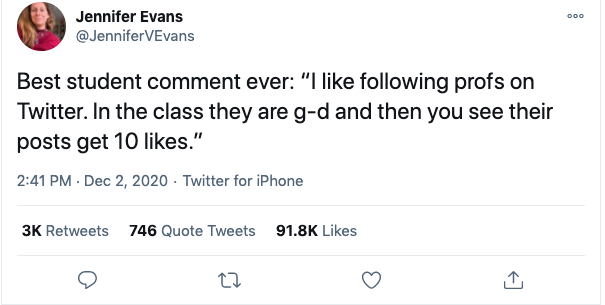Following the completion of HIST 5210A with Professor Jennifer Evans, both graduate students and the professor take time to examine how power structures, learning, and communications have been affected through online learning in this pandemic-plagued year. A short excerpt is below with the full article, “Levelling the Playing Field: Humour in the Zoom University,” available online.
 In just three days, this tweet was liked over 90,000 times. Responses varied from triumphant vindication (take that, students! So many more than 10 likes!) to moral panic (society is crumbling thanks to Twitter). Surprisingly few people recognized it for what it was: playful teasing between students and their professor as they wrapped up their last class of the term. As the students in question, we were fascinated by how academics on Twitter interpreted it as an example of how the digital environment was damaging to their status, or academia as a whole. Suddenly our seminar’s work, which focused on theories of power, took on added meaning. While none of us chose to do graduate school online, our class was proof you can create an online environment that fosters engagement and critical discussions. The best way to do so, from our perspective, was for the professor to let go of a need to protect their status and position of authority, and to encourage spaces of play.
In just three days, this tweet was liked over 90,000 times. Responses varied from triumphant vindication (take that, students! So many more than 10 likes!) to moral panic (society is crumbling thanks to Twitter). Surprisingly few people recognized it for what it was: playful teasing between students and their professor as they wrapped up their last class of the term. As the students in question, we were fascinated by how academics on Twitter interpreted it as an example of how the digital environment was damaging to their status, or academia as a whole. Suddenly our seminar’s work, which focused on theories of power, took on added meaning. While none of us chose to do graduate school online, our class was proof you can create an online environment that fosters engagement and critical discussions. The best way to do so, from our perspective, was for the professor to let go of a need to protect their status and position of authority, and to encourage spaces of play.
If this were any other semester, we would be running into each other on the Carleton University campus and joking about the class, or chatting in the elevator about what we thought of the readings. But this year, our confinement to the Zoom classroom altered the dynamic of the graduate seminar. Talking on mic was an intimidating prospect, and working through our thoughts was made harder by the inability to read our classmates’ faces (Did they agree? Were we making good points? Was anyone even listening?). We found ourselves turning more and more to the chat sidebar, which allowed us to respond to what others had said and to give positive feedback. We also began to use the chat to make jokes, which felt particularly necessary to get through analyzing Foucault. The chat became a space for personal anecdotes, tangents about the texts we were studying, and playful jabs at ourselves and each other.
On our last day of class, oddly, we found it hard to say goodbye. Despite all the doom-talk about Zoom University, we were ultimately able to create a learning environment that was both academically engaging and fun. It spoke, we thought, to our currently exacerbated desire for normalcy and connection. A university degree is meant to challenge you, to encourage you to critically examine your own preconceptions. And while it is supposed to be difficult, it can also be emotional. We wanted someone else to go through this with, and despite being confined to our bedrooms and basements, our desire for comradery was stronger still, and it emanated through the screen.
And so we made jokes in the chat, and one student’s comment went viral on Twitter.